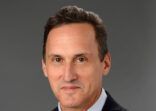The direction of interest rates is top of the mind for most investors, as markets head into 2024, because that ultimately drives asset prices.
After the US Federal Reserve’s latest “dot plot” showed it expects rate cuts next year, risk assets rallied sharply in response.
Mahmood Pradhan (main picture), head of global macroeconomics at the Amundi Investment Institute told FSA: “Central banks have paused. We think it’s very unlikely they will raise again.”
However, where interest rates finally settle depends on inflation, and this is where the “last mile” is the most difficult – according to many central bankers.
The marathon running analogy is used to illustrate how bringing inflation down from its 9% peak to 3% is much easier than bringing it down from 3% to 2%.
Indeed, there might be a good reason for central bankers to hold this view, as it can be difficult to fully conquer inflation when it becomes embedded in consumer expectations.
Stubborn inflation can manifest itself via sticky wage growth or through companies continually increasing prices to protect margins.
But despite the surprising resilience of the US economy over the course of 2023, inflation has in fact come down. The knock-on effect of this is that real interest rates have increased even though central banks have decreased the pace of monetary tightening.
The US consumer price index came in at 3.1% last month, while the Fed funds rate target is at a relatively high 5.25% to 5.5%.
“Real interest rates are quite high,” said Pradhan, who joined the French asset manager at the start of this year from the International Monetary Fund (IMF). “Monetary policy therefore is quite restricted. It’s restraining demand.”
“The longer the Fed holds rates at these levels and while inflation is making gradual progress down, the real interest rate will keep rising. So in effect, monetary policy gets more restrictive.”
When you throw in the fact that monetary policy often works with a lag, it suggests the first half of 2024 is when higher rates finally bite the economy, according to Pradhan.
This is because firms and households only start to really feel the effects of higher interest rates when they need to borrow or refinance, which doesn’t happen immediately.
“In the US for example, we think that the first half of next year will be a recession. It won’t be a hard landing, but a soft landing is not a safe landing,” Pradhan said.
“The weakness will still show up in the first half of next year for asset prices, and then the Fed will ease, and then we can see a gradual recovery in both economic activity and asset prices,” he added.
Beware of geopolitical risk
Another risk investors need to consider is any escalation of the conflict in the Middle East spreading to other countries in the region and disrupting oil supplies and therefore prices.
Notwithstanding the fact that oil prices are a key component to headline inflation, they can also drive-up inflation in other areas as was seen during 2022 due to the key role oil plays in nearly all parts of the economy.
“This time around, we do not fear that higher headline inflation because of oil would feed into higher core inflation,” Pradhan said.
“The reason for that is: policy is quite restricted compared with when we were coming out of Covid and seeing headline inflation feed into other things.”
However, given rising geopolitical tensions, increased trade protectionism, economic fragmentation and strained relations between US and China, Pradhan said he is surprised that hasn’t been an area of focus for markets this year.
“Markets have been focused quite a lot on interest rates, public debt, inflation, but there are other issues that are brewing that haven’t had so much of a narrative in markets,” he said.
“However, it is difficult to price-in because geopolitics is a bit like a zero-one event,” he admitted.

















